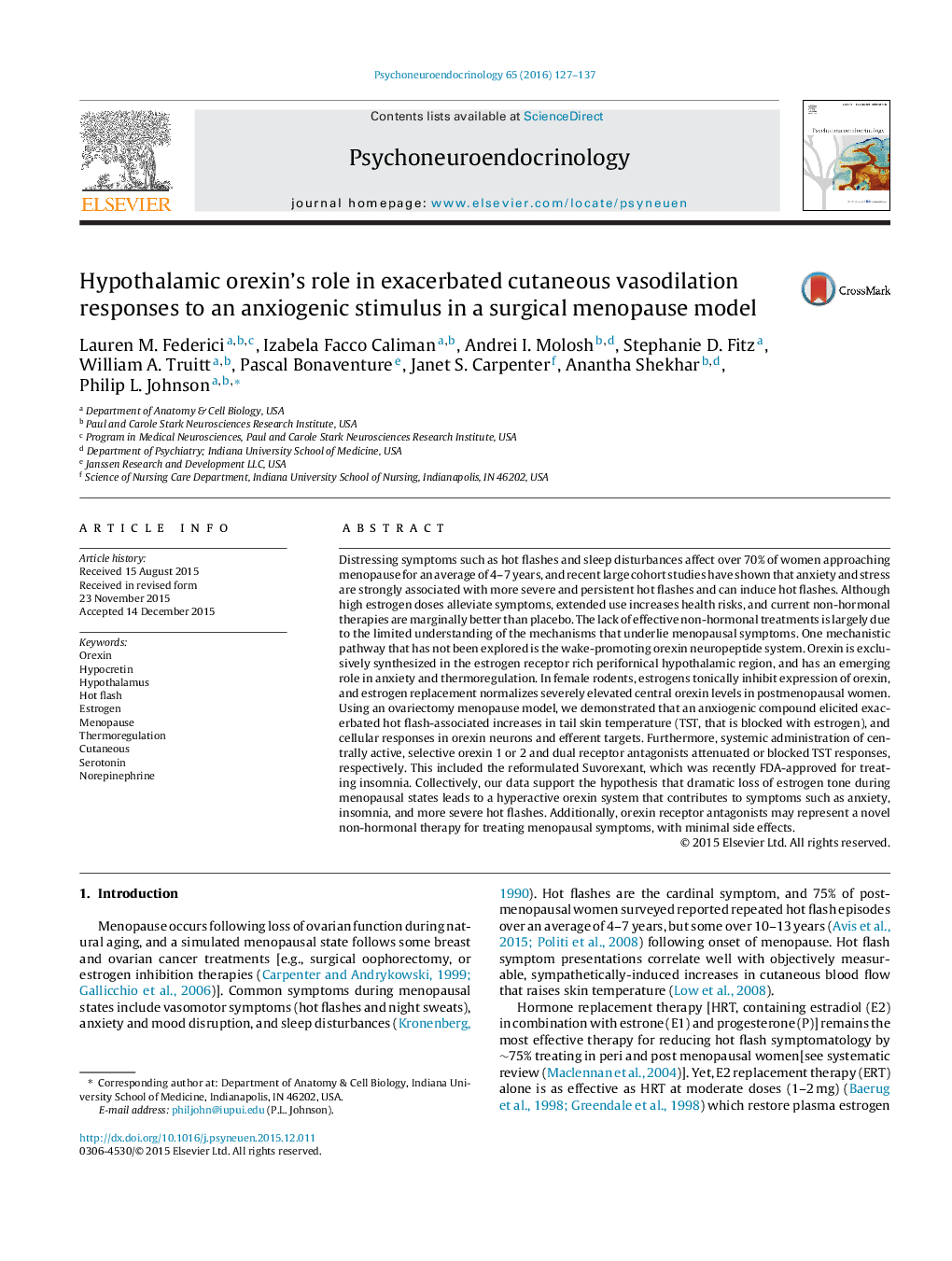| کد مقاله | کد نشریه | سال انتشار | مقاله انگلیسی | نسخه تمام متن |
|---|---|---|---|---|
| 6818356 | 547073 | 2016 | 11 صفحه PDF | دانلود رایگان |
عنوان انگلیسی مقاله ISI
Hypothalamic orexin's role in exacerbated cutaneous vasodilation responses to an anxiogenic stimulus in a surgical menopause model
ترجمه فارسی عنوان
نقش هیپوتالامیک اورکسین در واکنشهای واضعالعادی پوستی به یک محرک آنژینوژیک در یک مدل یائسگی جراحی
دانلود مقاله + سفارش ترجمه
دانلود مقاله ISI انگلیسی
رایگان برای ایرانیان
کلمات کلیدی
اورکسین، هیپوکراتین، هیپوتالاموس، فلاش داغ، استروژن، یائسگی، تنظیم حرارتی، پوستی سروتونین، نوراپی نفرین،
موضوعات مرتبط
علوم زیستی و بیوفناوری
بیوشیمی، ژنتیک و زیست شناسی مولکولی
علوم غدد
چکیده انگلیسی
Distressing symptoms such as hot flashes and sleep disturbances affect over 70% of women approaching menopause for an average of 4-7 years, and recent large cohort studies have shown that anxiety and stress are strongly associated with more severe and persistent hot flashes and can induce hot flashes. Although high estrogen doses alleviate symptoms, extended use increases health risks, and current non-hormonal therapies are marginally better than placebo. The lack of effective non-hormonal treatments is largely due to the limited understanding of the mechanisms that underlie menopausal symptoms. One mechanistic pathway that has not been explored is the wake-promoting orexin neuropeptide system. Orexin is exclusively synthesized in the estrogen receptor rich perifornical hypothalamic region, and has an emerging role in anxiety and thermoregulation. In female rodents, estrogens tonically inhibit expression of orexin, and estrogen replacement normalizes severely elevated central orexin levels in postmenopausal women. Using an ovariectomy menopause model, we demonstrated that an anxiogenic compound elicited exacerbated hot flash-associated increases in tail skin temperature (TST, that is blocked with estrogen), and cellular responses in orexin neurons and efferent targets. Furthermore, systemic administration of centrally active, selective orexin 1 or 2 and dual receptor antagonists attenuated or blocked TST responses, respectively. This included the reformulated Suvorexant, which was recently FDA-approved for treating insomnia. Collectively, our data support the hypothesis that dramatic loss of estrogen tone during menopausal states leads to a hyperactive orexin system that contributes to symptoms such as anxiety, insomnia, and more severe hot flashes. Additionally, orexin receptor antagonists may represent a novel non-hormonal therapy for treating menopausal symptoms, with minimal side effects.
ناشر
Database: Elsevier - ScienceDirect (ساینس دایرکت)
Journal: Psychoneuroendocrinology - Volume 65, March 2016, Pages 127-137
Journal: Psychoneuroendocrinology - Volume 65, March 2016, Pages 127-137
نویسندگان
Lauren M. Federici, Izabela Facco Caliman, Andrei I. Molosh, Stephanie D. Fitz, William A. Truitt, Pascal Bonaventure, Janet S. Carpenter, Anantha Shekhar, Philip L. Johnson,
